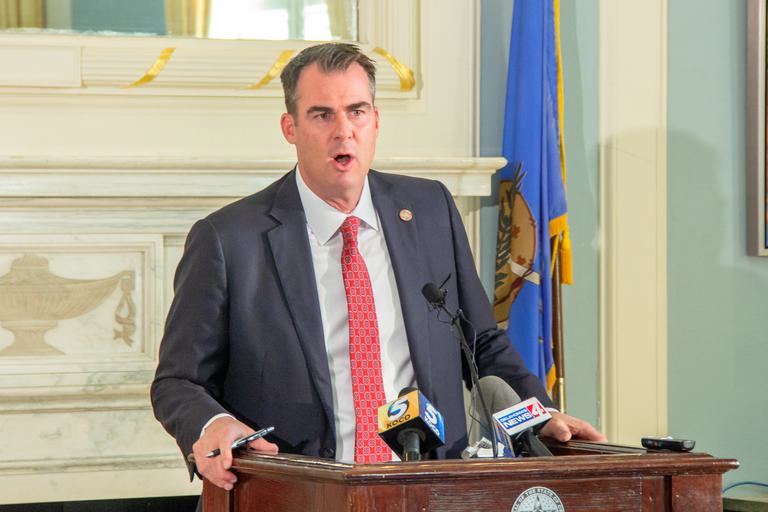
Budget & Tax
Ray Carter | September 27, 2019
Stitt cracks down on federal grants that lead to state spending hikes
Ray Carter
One agency’s use of federal grants led to diversion of a half-million dollars in state appropriations this year to replace those funds when the agency lost the grant. To prevent history from repeating, Gov. Kevin Stitt has ordered agencies to submit federal grant applications to his office for advance review.
“In this administration, we are focused on delivering transparency, accountability, and oversight of Oklahomans’ tax dollars, whether it’s generated through the feds, fees, or fines,” Stitt said. “With this executive order, we will work to avoid the pursuit of short-term money that often leaves taxpayers holding the bag when the funding dries up, while also making certain that the grants we do apply for match the vision and values of Oklahoma.”
Stitt’s action drew praise from one legislative leader who has worked to address this problem in prior years.
“It has been far too common in the past for an agency to apply and receive a federal grant, expand services beyond their core mission, then come to the Legislature to fund that programming when federal money is cut off,” said Senate President Pro Tempore Greg Treat, R-Oklahoma City. “Having a centralized source in the governor’s office will help end that bad practice. It also gives Oklahomans a better sense of accountability in how agencies seek federal funds and for what purposes.”
Stitt’s executive order requires all state agencies, boards, and commissions (other than colleges and local school district boards) to obtain the written approval of the appropriate gubernatorial cabinet secretary prior to beginning the application process for any grant involving more than $50,000.
For grants involving more than $100,000 in federal funding, agencies will be required to obtain the written approval of both the appropriate cabinet secretary and the governor’s secretary of budget.
The executive order does not apply to “emergency” grant funds typically distributed in less than 10 days, such as those provided by the Federal Emergency Management Agency after natural disasters, and any “formula” grants from the federal government that an agency, board, or commission has applied for in the past and received.
This year’s session provided an example of the problem Stitt is targeting. Treat’s office noted that the Oklahoma Department of Mental Health and Substance Abuse Services had previously relied on a suicide prevention grant that ended, and an additional state appropriation of $500,000 was required this year to make up for that loss.
A spokesman for Treat noted that the mental health department also relies on “system of care” grants where federal participation decreases each year of the five-year grant, leading to ever-growing demand for increased state appropriations.
Stitt’s approach to oversight of state agencies’ use of federal funds contrasts with his predecessor, former Gov. Mary Fallin.
In both 2013 and 2015, state lawmakers approved legislation that would have required state agencies to publish information on all federal funding used at an agency. The 2013 legislation not only required public reporting of agencies’ use of federal funds, but also required agencies to “develop a contingency plan and corresponding budget to be prepared for up to a twenty-five percent (25%) reduction in any applicable federal monies, whether appropriated or received in block grant or any other form.”
Fallin vetoed both bills.
When she vetoed the 2013 transparency bill, Fallin wrote that the state budget process “allows for ample review of federal programs and funding” and that the reporting requirement would “place undue burden on state agencies.”
When she vetoed the 2015 version of the legislation, which did not require contingency planning, Fallin’s veto message again declared the transparency measure would “cause agencies to re-direct staff from essential duties or even hire additional staff in order to meet these new and onerous reporting obligations.”
Treat was the author of the 2015 legislation.
In contrast, when a similar federal-funds transparency bill passed in the 2019 legislative session, Stitt signed it into law. When he announced his executive order requiring advance approval for grant funding, Stitt noted his executive budget this year “outlined total dollars spent by state agencies, to include roughly 30% of funding that comes from the federal government.” Stitt said that marked the “first time in state history” a governor’s budget had accounted for all funds spent by agencies.
While Treat praised Stitt’s order, House Democratic Leader Emily Virgin of Norman panned it, telling online news source NonDoc.com that Stitt was creating “barriers between state agencies and federal tax dollars” and “obviously doesn’t have faith that state employees on the ground can handle this task.”

Ray Carter
Director, Center for Independent Journalism
Ray Carter is the director of OCPA’s Center for Independent Journalism. He has two decades of experience in journalism and communications. He previously served as senior Capitol reporter for The Journal Record, media director for the Oklahoma House of Representatives, and chief editorial writer at The Oklahoman. As a reporter for The Journal Record, Carter received 12 Carl Rogan Awards in four years—including awards for investigative reporting, general news reporting, feature writing, spot news reporting, business reporting, and sports reporting. While at The Oklahoman, he was the recipient of several awards, including first place in the editorial writing category of the Associated Press/Oklahoma News Executives Carl Rogan Memorial News Excellence Competition for an editorial on the history of racism in the Oklahoma legislature.